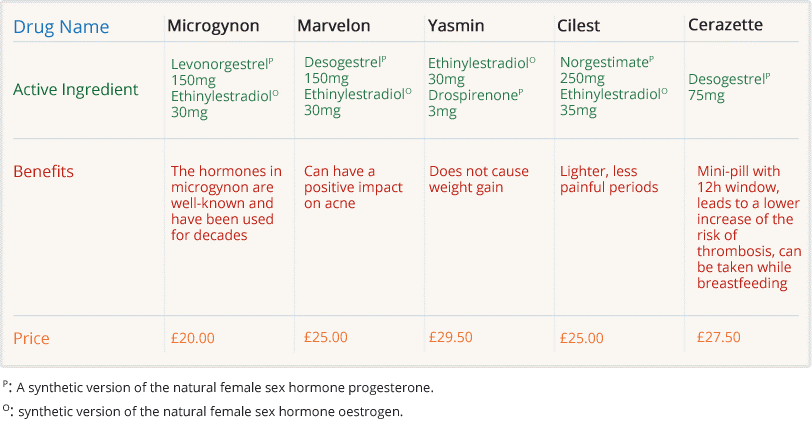Contraception has never been easier. But with over 28 types of contraceptive pill to choose from, finding the right one for you can be tricky. We’ve asked, Dr Sebastian Winckler a GP from Superdrug Online Doctor for some insight on the different brands available and have compiled a guide on contraceptive pill brands to help you find your match
There are a number of points to consider when choosing a contraceptive pill, such as your general health, lifestyle and particular conditions you may suffer from.
Do all contraceptive pills work in the same way?
All types of combined contraceptive pills work in the same way (for example Microgynon, Yasmin, Cilest and Marvelon). They prevent pregnancy by stopping ovulation and they also thicken the mucus at the entrance to the womb, which means that sperm cannot get to the egg and fertilize it. The hormones in the contraceptive pill also cause changes to the lining of the uterus, so that even if the first two mechanisms should fail to prevent pregnancy, a fertilized egg can’t implant and develop. The only exception are some mini pills, which do not always prevent ovulation but rely on preventing that an egg is fertilized and implants.
Oestrogen, progestin – what does it all mean?
Pills which contain more progestin and pills which contain more oestrogen have slightly different side effects and benefits.
Women who worry about weight gain prefer pills with a lower dose of oestrogen, such as Yasmin or Cilest. These pills are less likely to cause water retention, which results in weight gain. Women who suffer from acne, however, can benefit from taking a pill with a lesser dose of progestin and a higher dose of oestrogen, such as the pill Marvelon.
It is important to bear in mind, that it is quite normal to experience side effects during the first three months of treatment. These initial side effects often subside as your body gets used to the hormones. If side effects remain after three months, you may need to switch to a pill with a different oestrogen dosage or a different type of progestin.
I suffer from headaches – which pill can I take?
Migraines in women are often caused by the changing hormone levels throughout the month. Taking an oral contraceptive can improve an existing migraine but it can also sometimes make it worse. According to recent research, lower dose pills with an oestrogen dose of 20mg are less likely to cause headaches or worsen migraines.
Women who suffer from migraines often find that they experience headaches during the pill-free week every month. This is due to the sudden drop in oestrogen, which is a known trigger for migraines. Skipping the pill free week and taking the tablets continuously can help reduce the frequency of migraines significantly.
Women who suffer from migraines with a so-called aura (which can involve symptoms of dizziness, visual disturbances and sensitivity to light) cannot take a combined contraceptive pill.

Women who take a contraceptive pill normally experience lighter and less painful periods, especially if they take a combined pill. The effects of a contraceptive pill differ between women and the only way to know whether a certain pill will help is to try it.
For women who suffer from particularly severe periods, the pill Yaz offers a shortened cycle, with only four pill free days per month.
Can I take the pill while breastfeeding?
You cannot take a combined oral contraceptive while you’re breastfeeding but you can still take a progestin-only mini-pill. The low dose of progesterone in mini pills will not harm your baby – but it is just as effective in preventing unwanted pregnancies.
Mini-pills can be a little less convenient because they have to be taken at the exact same time every day to remain effective. However, some newer versions of the mini-pill, such as Cerazette, can be taken within a twelve hour window, combining a low hormone dose with convenience.
The mini-pill is also recommended for women who cannot take oestrogen because they have an increased risk of thrombosis – for example because they are over the age of 35 and smokers or very overweight.
So, which pill is right for me?
When prescribing a pill, your GP will consider your general health as well as any conditions you suffer from to help you find the most suitable contraceptive pill. It’s difficult for your doctor to predict how your body will respond to a certain progestin or oestrogen dose, so you may need to try more than one pill before you find one that you are happy with.
The good news is: Once you have adjusted to a pill you can take it as long as you like. Contrary to common belief you do not need to take long breaks from the pill. Provided you don’t have any side effects you can continue taking it – even until the menopause.
Still confused? The table below explains the benefits of some common pills:
Like this article? Sign up to our newsletter to get more articles like this delivered straight to your inbox.
























































